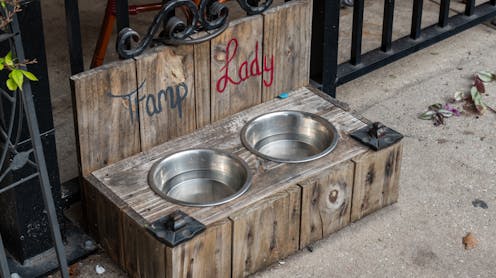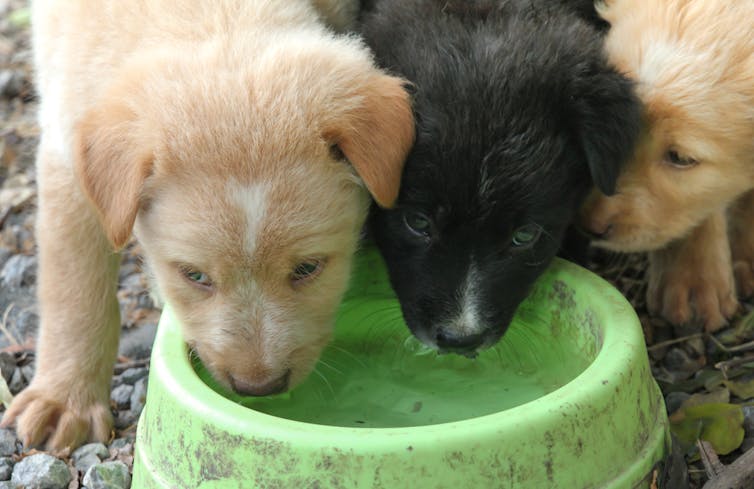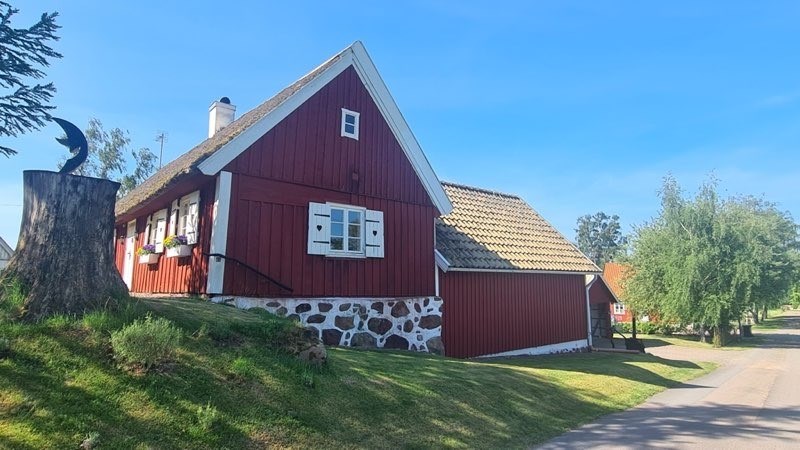Detta inlägg post publicerades ursprungligen på denna sida this site ;
Date:
Author: Jacqueline Boyd, Senior Lecturer in Animal Science, Nottingham Trent University
Original article: https://theconversation.com/why-its-not-safe-for-dogs-to-drink-from-communal-water-bowls-253550

On a bright, sunny day, after a nice walk with your dog, you stop at a local cafe to grab a drink. At the counter, you spot a water bowl for your dog. But before letting your dog take a sip, consider this: shared water bowls can be a breeding ground for harmful bugs that could make your dog sick.
Water is essential for dogs’ health, supporting normal body functions and regulating temperature. During warmer weather or after exercise, it’s especially important to ensure your dog stays hydrated.
This is because dogs are limited in their ability to cool down by sweating in the same way as we can. Instead, they rely on panting to regulate their body temperature, and water is essential to support this.
Water is usually offered to dogs in bowls, although dogs eating high-moisture food such as raw meat or tinned food will drink less than dogs eating dry dog food. Keeping food and water bowls clean is essential, and they should be regularly washed (at least daily) using hot water or in a dishwasher. This is important to protect dog and human health as antibiotic-resistant Escherichia coli has been found in dog feeding bowls, suggesting a potential route of transmission.
Where dogs might share bowls for food or water, there is also the risk of dangerous bacteria such as MRSA (methicillin-resistant Staphylococcus aureus spreading between dogs and their owners. This bug is responsible for skin and soft-tissue infections and can be difficult to control with standard antibiotics.
Dogs might also accidentally share other infections via water bowls. Respiratory infections with a bacterial or viral origin can easily be shared when water or bowls become contaminated with saliva or nasal secretions. The dreaded kennel cough – characterised by a distressing, dry, hacking cough – spreads quickly when dogs are in close contact. Contaminated objects, including toys, bedding and water bowls, are likely to be heavily involved in its transmission.

Akkalak Aiempradit/Shutterstock
One difficultly is that several different bugs can be responsible for kennel cough, such as Bordetella bronchiseptica and canine influenza virus. The range of possible causative agents makes control, diagnosis and treatment of kennel cough tricky.
Water bowls can also be a source of disease-causing adenoviruses that originate from faecal contamination of surfaces and objects. These viruses can be responsible for hepatitis and respiratory infections, making them a real threat to your dog’s health.
Protect the vulnerable
Preventing your dog having access to shared water bowls is a good idea, especially if they are at higher risk of infection – young puppies, unvaccinated adults, or older dogs, for example. Equally, if you or anyone in your household has a weak immune system, infection spread from pets is a real risk, too.
As any dog owner knows, getting them to make healthy choices can be a battle. My dogs, despite my best efforts, still indulge in muddy puddles and the occasional snack of less-than-appealing things — all potential infection risks.
To protect your dog from infections, bring your own water and bowl when out and about. If using a communal bowl, make sure it’s been freshly cleaned and refilled. A small effort can make a big difference in your dog’s health.
![]()
Jacqueline Boyd is affiliated with The Kennel Club (UK) through membership and as advisor to the Health Advisory Group. Jacqueline is a full member of the Association of Pet Dog Trainers (APDT #01583) and she also writes, consults and coaches on canine matters on an independent basis, in addition to her academic affiliation at Nottingham Trent University.

